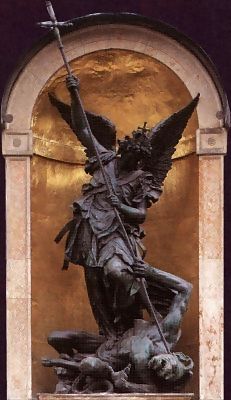St. Michael the Archangel

The Church invokes him now, as her defender, as the peacemaker who prohibits divisions, and as the consecrator of places to repent in.
An angellic hagiography bears some attention. First, the story serves a useful theodical purpose in the grammar of the faith, by reminding us that though evil is a personal force, it is no rival to the personal God; the Evil One is the antagonist of the holy angels merely, and poses no threat or claim against God almighty.
Secondly, the story of Michael's confession serves as a kind of primodial reference to the embodied life of the Church that Catholics honor; through God's prior and electing grace, combined with the cooperative obedience of the creature, God's will is enacted by a particular person, over and over again. The confession instantiates the confessor as God's own agent, and it is not so much the confession that is canonized, but the person who utters it: Michael's battle cry summons the armies of Heaven and identifies him as its general, Mary's fiat opens her womb for the incarnation of God, Peter's submission launches him into the shepherding authority anticipated by Adam, Moses, and David. Etc.
Most of all, Michael's submission makes him peacemaker and restorer. As the author of Ephesians sings, division and its attendent ilnesses are not the result of woundedness, but of rebellion; and Michael unites the host of Heaven by acting with the humility that is opposite Lucifer's pride and treason. Augustine describes the scene extensively in the City of God. All divions began in Heaven; the Fall occurs long before the creation of humanity, at the point where Satan envies God's authority. The result is deprivation: "Satan fell not from a state he had received, but from what he would have received had he chosen to submit to God." (Super Genesis xi.23) Thus the will of God, the freedom of the creature, and the rightful, flourishing unity that reflects the life of the Trinity is restored by nothing less than obedience, since unity and flourishing were first undone by rebellion. Is there something to the fact that the same pope promulgated an urgent prayer to this archangel and a decisive codification of Catholic instincts about schisms in the same decade? I sometimes think there is.
It's also interesting to me that Michael's submission is expressed in the Hebraism of an open-ended question: who is like the Lord? The rhetoric bespeaks the kind of obedience that preceeds understanding (anyone read At the Back of the North Wind lately?) In other words, the defender of the Church wins the day through one open-ended, trusting question that refutes the endless question-begging of the Evil One. Satan, it seems, will always be asking whether or not God really did say...
Michael shows us, simply, that the proper reply refers us not to a syllogism, but to God Himself- who is like the Lord?


<< Home